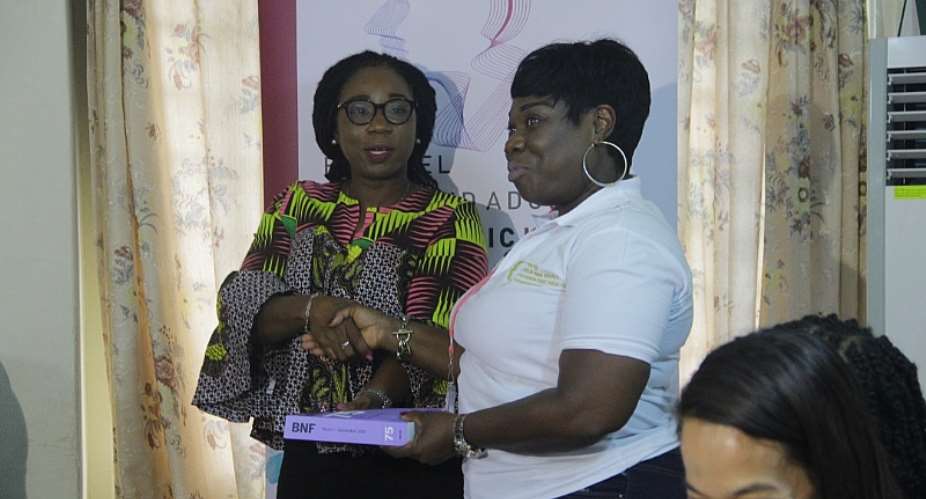Besstel Child and Adult Psychiatric Health Foundation and its partners have signed a memorandum of understanding with the Ghana Mental Health Authority (GMHA) under the auspices of the Ministry of Health.
The MOU signing, which formalises the relationship between fours bodies, is a five-year partnership that would see the new partners working together to improve mental health delivery in Ghana. The signatories to the MOU also included The South London and Maudsley NHS Trust Foundation and the Ghana-United Kingdom Mental Alliance.
Speaking at the signing event held at the premises of the GMHA, Deputy Chief Executive Officer (CEO) of the Authority, Dr Carolyn Amissah expressed delight over the formalisation of this partnership. She noted that the partnership would bolster the efforts of the authority in delivering mental healthcare.
“I believe that this collaboration, while helping the Mental health Authority to fulfil its mandate, will also help us in improving the kind of care that provide to our clients or our patients, wherever they are; both in the public and in the private sector,” she said.
The Ghana Mental Health Authority was established in 2013 following the passage of the Mental Health Authority Act 2012. Its mandate is to promote and implement mental health policies and provide culturally appropriate, humane and integrated mental health care throughout Ghana. The Authority is governed by the Mental Health Board appointed by the President of the Republic of Ghana and composed of a Chairman, Chief Executive and nine other members.
Meanwhile, Life Patron of Besstel Foundation, Mr Peter Hasler indicated that the agreement with the GMHA was currently only a commitment to working together. He therefore emphasised that expectations from the agreement must be measured. He however promised that the partners shall commit to improving mental health delivery in Ghana.
“At this level, it [MOU] is effectively a commitment to work together on a common cause. And that is the promotion of mental health services. And I want to get people to appreciate that this document links us together to make sure that we’re moving forward and to make sure that we’re using each other’s expertise on a very important agenda,” he noted.
Founder and Executive Director of Besstel, Stella Ewuradjoa Nutakor assured stakeholders that her outfit is fully committed to ensuring this partnership is fully exploited to the benefit of mental health patients. She added that Besstel’s track record of delivering impact speaks to the organisation’s ethic of putting patients first and developing solutions for them. Despite being a young organisation, she believed Bestell has contributed greatly to improving mental healthcare in Ghana.
“When we first came here, we actually worked with and supported Ankaful. There’s evidence of what we've done. And I think those we've worked with will testify that we’re slowly getting there. It’ll take time. You're not going to see the evidence here and now,” she disclosed.
Beyond the signing of the MOU, Bestell through its partners at the West London Mental Health Trust donated some resource materials to the GMHA. The books authored in the United Kingdom was donated in the hope of increasing understanding of mental health and guiding professionals on making better decisions.
Bestell and its partners shall hold a number of activities in the next ten days all aimed at engaging stakeholders and building relationships towards the improvement of mental healthcare in Ghana. The delegation shall meet development stakeholders such as the Department for International Development (DFID), the Rotary Club and The Asantehene, Otumfuo Osei Tutu IV. Further engagements shall also be held with health service providers such as the Okomfo Anokye Hospital, 37 Military Hospital and the Ministry of Health.
With a treatment gap of over 98%, Ghana’s mental healthcare delivery systems is grossly inadequate. Ghana currently has only three facilities nationwide; all located in the south. The critical lack of psychiatric workers and facilities forces mental health patients turn to spiritual healers for help. Over the years, government has done little to improve healthcare in the sector, with stakeholders having to depend on the benevolence of charities like Besstel to provide support.
Ghanaians would therefore have high expectations of this great partnership and hope it can vastly improve upon mental health delivery in Ghana.









 Ejisu by-election: Aduomi warns NPP against voter intimidation
Ejisu by-election: Aduomi warns NPP against voter intimidation
 High Court orders implicated four NDA officials to present defence
High Court orders implicated four NDA officials to present defence
 Let’s all be matured, patriotic to have a peaceful election this year – Dampare ...
Let’s all be matured, patriotic to have a peaceful election this year – Dampare ...
 Mahama's administration saw thievery that knew no bounds; stole from market wome...
Mahama's administration saw thievery that knew no bounds; stole from market wome...
 GRA/SML deal: Always read the stories behind the headlines or you'd look stupid ...
GRA/SML deal: Always read the stories behind the headlines or you'd look stupid ...
 GRA/SML Contract: It takes some 'wild' boldness for a president to make this dec...
GRA/SML Contract: It takes some 'wild' boldness for a president to make this dec...
 Elisu By-election: "If you call yourself a man, boo Chairman Wontumi again" — Bo...
Elisu By-election: "If you call yourself a man, boo Chairman Wontumi again" — Bo...
 Fuel tanker driver escapes with his life after tanker goes up in flames near Suh...
Fuel tanker driver escapes with his life after tanker goes up in flames near Suh...
 Uniform change: ‘Blue and white are brighter colours’ — Kwasi Kwarteng explains ...
Uniform change: ‘Blue and white are brighter colours’ — Kwasi Kwarteng explains ...
 MoE not changing all public basic school uniforms but only newly built ones — Kw...
MoE not changing all public basic school uniforms but only newly built ones — Kw...
